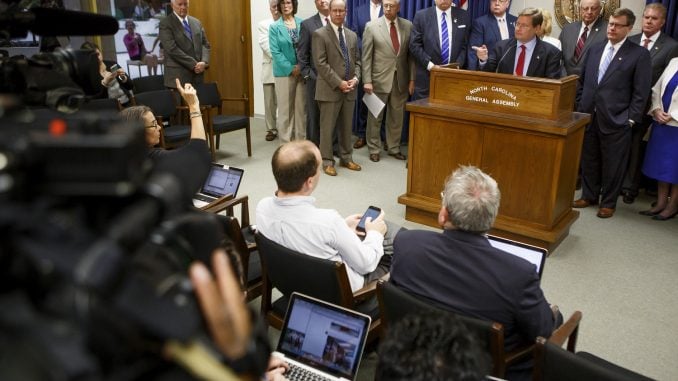
RALEIGH As the 2017 legislative session approaches its conclusion with the budget conference process starting in earnest this week, North State Journal sat down with N.C. House Majority Leader Rep. John Bell (R-Wayne) to ask him about Democratic Gov. Roy Cooper’s latest calls for special elections and expedited redistricting, as well as budget prospects and remaining policy priorities before the session adjourns.Cooper called for special elections last Tuesday, despite higher court opinions framing such early elections as constitutionally unsound.”We’re disappointed in the way he’s playing politics, but it’s our job to deal with those battles when they come up, but right now our focus is on delivering a budget for the citizens of the state,” said Bell. “It’s very interesting because the governor, when he first got elected, was all over the state saying he wanted to work with the General Assembly and try to do what’s right for the state of North Carolina … and instead of working with us, he is now trying to play politics.”And it’s very interesting that over the last couple years when he was attorney general he couldn’t go in a courtroom and now that he’s governor he’s spending an awful lot of time in the courtroom,” Bell added.Further, Bell indicated there is not enough time to properly traverse the redistricting process and hold elections.”What I would like to see and what I hope we do is have a transparent, open process,” said Bell. “Go around the state and have community forums to talk about redistricting to get input from the entire state like we’ve done in the past.”Bell also addressed some notable legislation recently passing the N.C. House, such as energy reform and concealed carry reforms.”This was about a nine-month process of working with stakeholders to try to find some type of agreement,” said Bell of the energy compromise. “At the end of the day, what it did do is it protected the ratepayers, it allowed for energy prices for businesses and everyday citizens to not skyrocket through the roof and it’s a step in the right direction.”However, Bell said the work on energy reform is far from over.”I’d like to move further. I’d like to address some of the other issues like the property tax abatement in the counties for renewable energy … to address encroachment issues such as with the wind turbines.” stated Bell. “We still have to look at this I just believe [renewable energy] should be able to stand on its own and not be subsidized by taxpayers.”Bell is hopeful the N.C. Senate will pick up the recently passed concealed carry bill and that popular misconceptions of the bill are put to rest.”The most interesting thing about the bill itself is not the bill itself,” said Bell. “When you read the bill and see the language and actually take the time to understand the bill, critics will see that this is pretty good policy and a pro-Second Amendment bill.”When you look at the false narratives that have been put out there even to the point where it says it’s getting rid of concealed carry, getting rid of pistol purchase permits those things are simply not true.”The budget reconciliation process remains the biggest hurdle to clear before lawmakers adjourn for the year, and Bell is confident differences between the two chambers’ proposals will be resolved.”The two big issues left on the table are how are we going to address the salary increase for state employees and teachers, and the tax plan,” said Bell. “The other stuff we should be able to work out in a timely manner, but those are the two big-ticket items that we have a little bit of difference on between the House and the Senate.”On the House side we put together a tax plan that doesn’t do as deep of tax cuts [as the Senate]. Both chambers want tax cuts. How we get to the same goal is completely different the Senate wants to take a more aggressive approach, we want to take a more gradual approach. Our caucus is pretty united behind that.”Even when a consensus budget is passed, it could face a veto from the governor.”The narrative the governor’s already starting is that he’s going to veto the budget,” said Bell. “That’s the direction I feel he’s probably going to end up going in, just because it’s a Republican budget it’s probably not going to matter what’s actually in the budget. If he vetoes that he’s playing politics, not actually dealing with policy.”Lawmakers hope to complete budget negotiations and remaining policy priorities in time to adjourn before the July 4 holiday.



